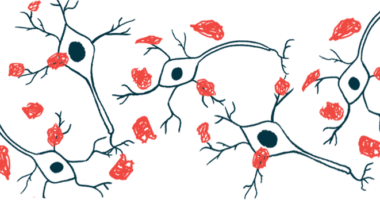UCB and Novartis Join to Advance Oral Therapy Now in Phase 2 Trial

UCB is partnering with Novartis to co-develop and potentially market UCB0599, a small molecule to inhibit misfolding of the alpha-synuclein protein now in a Phase 2 clinical trial enrolling people with Parkinson’s disease.
The agreement also includes an option to co-develop UCB7853 — an antibody against alpha-synuclein — currently in Phase 1 testing as a possible Parkinson’s treatment.
“This partnership has the potential to be transformational for people living with Parkinson’s disease, as it will combine UCB’s expertise … in the field of neurodegenerative disease with Novartis’… experience developing transformative, disease modifying treatments for a range of neurological conditions,” Dhaval Patel, executive vice president and chief scientific officer at UCB, said in a press release.
In Parkinson’s disease, nerve cell loss is triggered by the toxic buildup of misfolded alpha-synuclein, a protein that is thought to help regulate nerve cell function and communication. UCB0599 is an orally available small molecule designed to suppress alpha-synuclein misfolding to potentially slow disease progression.
It is able to cross the blood-brain barrier, a semipermeable membrane that protects the brain and spinal cord and is often an obstacle for therapies that target the brain.
The Phase 2 randomized and double-blind trial, called ORCHESTRA (NCT04658186), is evaluating the efficacy, safety and tolerability of oral UCB0599 against placebo in up to 300 people with early-stage Parkinson’s, ages 40 to 75. It is currently recruiting eligible patients at sites across the U.S., Canada, and Europe.
Patients will be randomly assigned to a predetermined dose of UCB0599 or a placebo capsule. The trial’s main goal is evidence of treatment superiority over placebo in slowing disease progression as measured by changes in the sum of the Movement Disorder Society Unified Parkinson’s Disease Rating Scale (MDS-UPDRS) Parts I-III from the study’s start to up to 18 months of treatment. This scale assesses Parkinson’s motor and non-motor signs and symptoms, including cognitive impairment, sleep problems, speech, and facial expression.
Among eligibility requirements for this study is that patients are not yet using treatments for Parkinson’s motor symptoms.
A previous Phase 1b trial found that UCB0599, as a twice-daily oral capsule given at two doses (90 mg and 180 mg), was well-tolerated in people with mild to moderate disease.
Under the terms of the agreement, UCB and Novartis will jointly develop and fund further global work on UCB0599. Novartis also has the option of helping with worldwide development of UCB7853 upon completion of the early clinical trial being run by UCB.
This two-part Phase 1 trial (NCT04651153) is currently recruiting up to 64 people — a mix of healthy men and Parkinson’s patients — at single a U.K. site. It is evaluating the safety and properties of UCB7853, given as a single intravenous infusion at multiple ascending doses to healthy volunteers and as multiple infusions of ascending doses to patients. Both will be compared with placebo infusions given to these groups.
Under the agreement, UCB will receive $150 million upfront with the possibility of future payments worth up to $1.5 billion should specified development milestones, regulatory approvals and sales goals be met. Should approval be given, UCB will be responsible for marketing the treatment in Europe and Japan, and Novartis will be responsible for the U.S. market and all other territories.
“It is our long-term ambition to transform the Parkinson’s treatment landscape from the management of symptoms, to treatments that can slow or stop the progression of disease,” said Charl van Zyl, executive vice president, neurology & head of Europe/International Markets for UCB.
“By sharing resources and working together we think we can best optimize our chances of success and realize our Parkinson’s ambitions,” van Zyl added.







